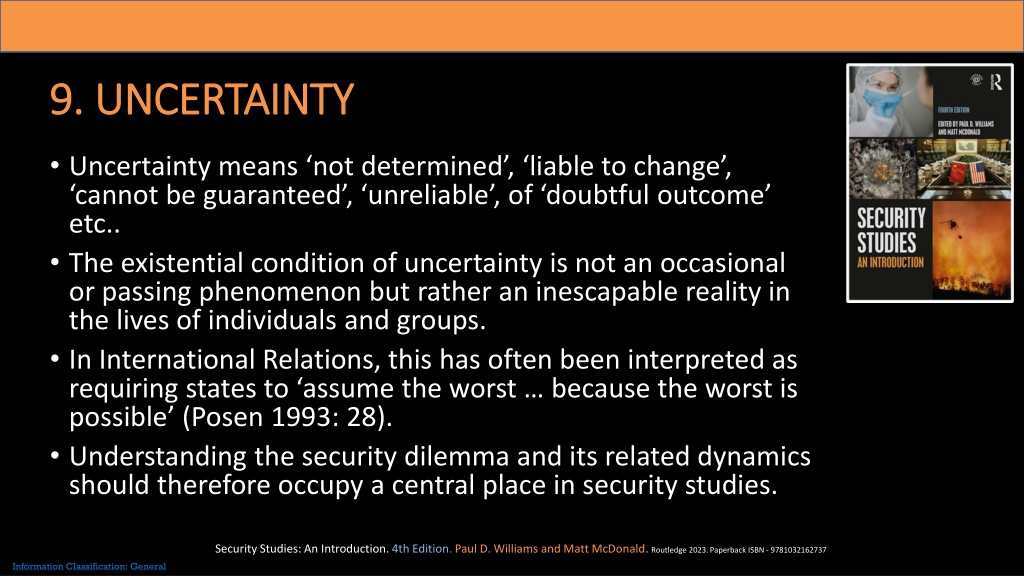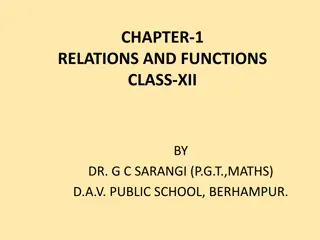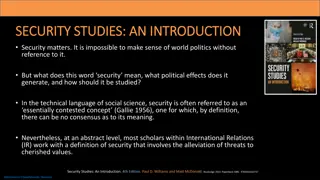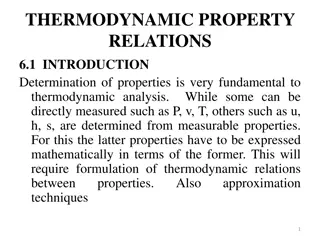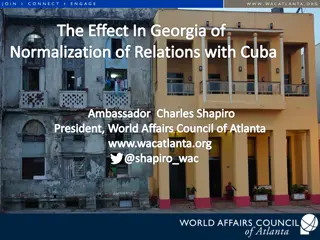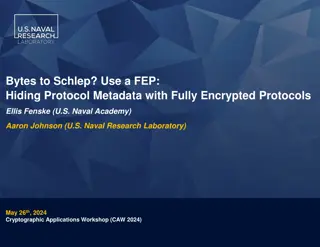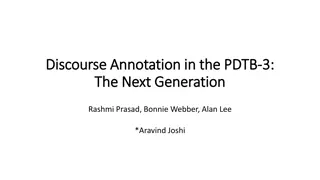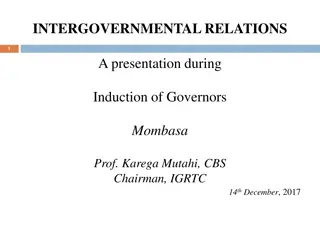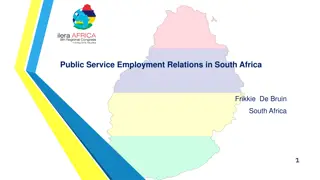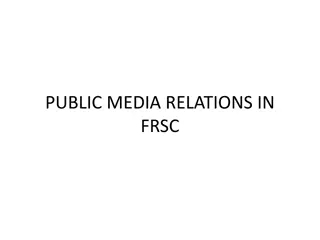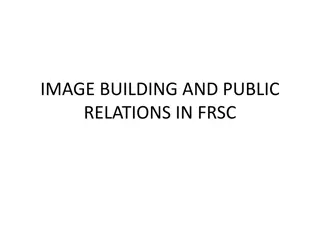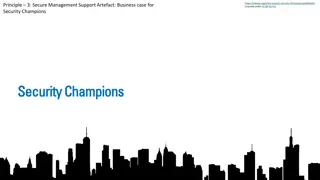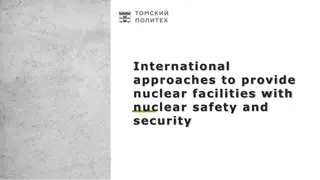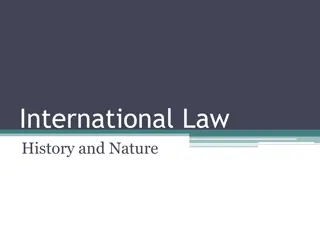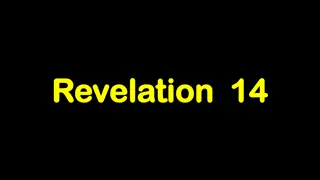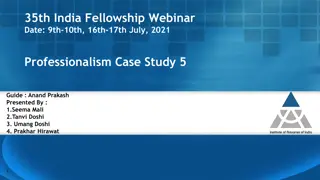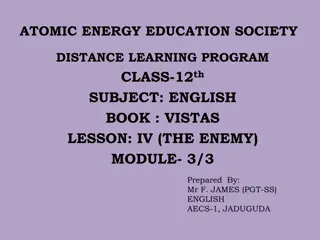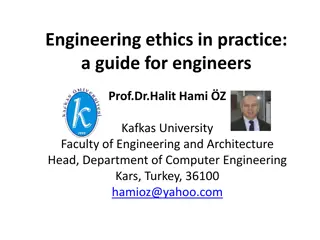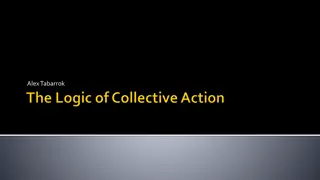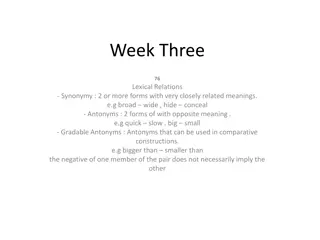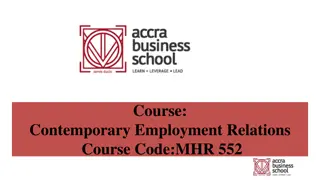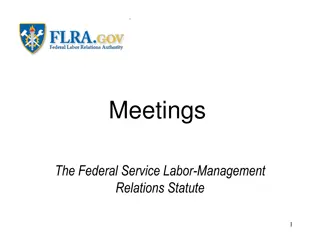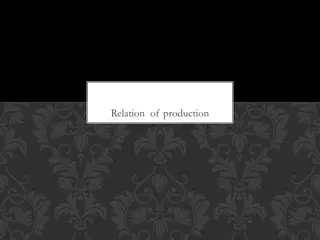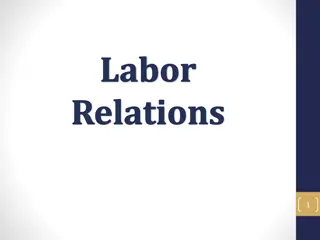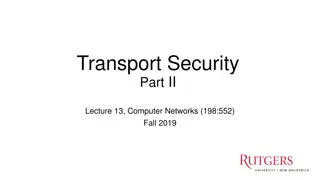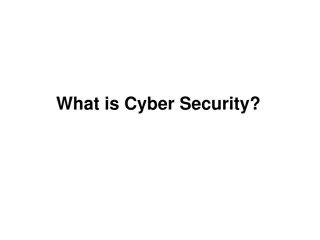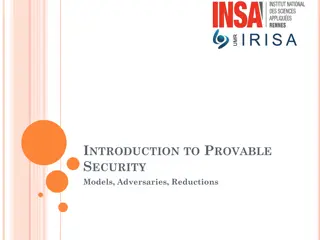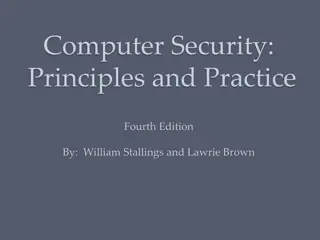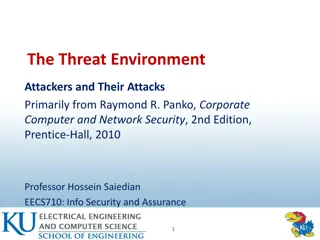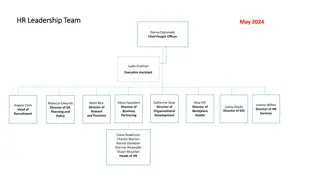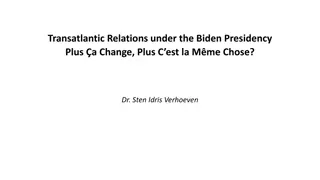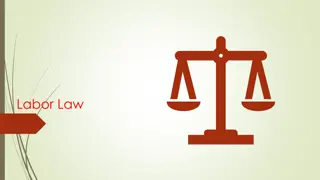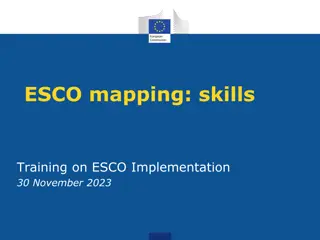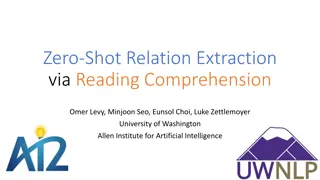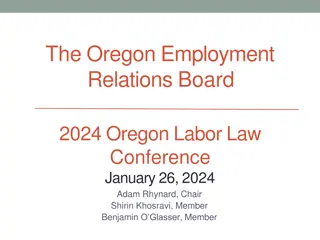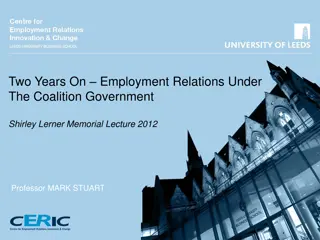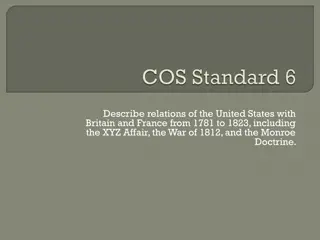Understanding the Security Dilemma in International Relations
Uncertainty is inherent in the lives of individuals and groups, leading to the need for states to assume the worst in international relations. The security dilemma, conceptualized as a two-level strategic predicament, revolves around interpreting the intentions and capabilities of others and deciding on the best response. Material and psychological factors drive the dynamics of the security dilemma, creating challenges in distinguishing between offensive and defensive measures.
- Security Dilemma
- International Relations
- Uncertainty
- Strategic Predicament
- Material & Psychological Factors
Download Presentation

Please find below an Image/Link to download the presentation.
The content on the website is provided AS IS for your information and personal use only. It may not be sold, licensed, or shared on other websites without obtaining consent from the author. Download presentation by click this link. If you encounter any issues during the download, it is possible that the publisher has removed the file from their server.
E N D
Presentation Transcript
9. UNCERTAINTY 9. UNCERTAINTY Uncertainty means not determined , liable to change , cannot be guaranteed , unreliable , of doubtful outcome etc.. The existential condition of uncertainty is not an occasional or passing phenomenon but rather an inescapable reality in the lives of individuals and groups. In International Relations, this has often been interpreted as requiring states to assume the worst because the worst is possible (Posen 1993: 28). Understanding the security dilemma and its related dynamics should therefore occupy a central place in security studies. Security Studies: An Introduction. 4th Edition. Paul D. Williams and Matt McDonald. Routledge 2023. Paperback ISBN - 9781032162737 Information Classification: General
THE QUINTESSENTIAL DILEMMA THE QUINTESSENTIAL DILEMMA The security dilemma can be thought of as the quintessential dilemma in international relations because it demands that states contemplate insecurity even when it does not immediately appear to exist. As a consequence, governments often struggle to signal peaceful/defensive intentions towards each other. For those with mindsets dominated by the dark shadow of future uncertainty, international politics is a potential or actual war system even when all involved believe their own intentions are peaceful, and their military preparations are defensive. Security Studies: An Introduction. 4th Edition. Paul D. Williams and Matt McDonald. Routledge 2023. Paperback ISBN - 9781032162737 Information Classification: General
WHAT IS THE SECURITY DILEMMA? WHAT IS THE SECURITY DILEMMA? In 1950, John Herz defined the security dilemma as Groups or individuals [who] must be, and usually are, concerned about their security from being attacked, subjected, dominated, or annihilated by other groups and individuals . In 2008, Booth & Wheeler developed Herz s position to define the security dilemma as a two-level strategic predicament in relations between states and other actors, with each level consisting of two related lemmas (or propositions that can be assumed to be valid) which force decision-makers to choose between them. 1. The first and basic level consists of a dilemma of interpretation about the motives, intentions, and capabilities of others. 2. The second and derivative level consists of a dilemma of response about the most rational way of responding. This dilemma of response logically begins when decision-makers have resolved this dilemma of interpretation. They then need to determine how best to react. Security Studies: An Introduction. 4th Edition. Paul D. Williams and Matt McDonald. Routledge 2023. Paperback ISBN - 9781032162737 Information Classification: General
THE DRIVERS OF THE SECURITY DILEMMA THE DRIVERS OF THE SECURITY DILEMMA The drivers of security dilemma dynamics are complex but can be simply categorized as mainly material or mainly psychological. 1. In material terms, the problem is the ambiguous symbolism of weapons and their deployment (Booth and Wheeler 2008). This is the difficulty of safely distinguishing between offensive and defensive weapons. This is especially difficult in international relations because ostensibly defensive measures (e.g., missile defence systems) might become a vital part of an offensive strategy when used in combination with other weapons. 2. In psychological terms, the problem is the phenomenon philosophers call the Other Minds problem (Hollis and Smith 1990). The challenge is how to get into the heads of those involved in decision- making and policy-planning in other states. It has led to all sorts of misperceptions in international politics - a context characterised by fear and self-help imperatives. Security Studies: An Introduction. 4th Edition. Paul D. Williams and Matt McDonald. Routledge 2023. Paperback ISBN - 9781032162737 Information Classification: General
SECURITY DILEMMAS AND SECURITY SECURITY DILEMMAS AND SECURITY CHALLENGES CHALLENGES If the dilemma of interpretation is settled in favour of the view that another state is a definite threat to one s own national security characterized as an enemy there is no longer a security dilemma: the dilemma has been resolved, accurately or mistakenly, and the other state is regarded as posing a strategic challenge (Booth and Wheeler 2008: 9). The change of a relationship from a security dilemma to a strategic challenge does not remove all uncertainty. Rather, it removes one set of uncertainties, only to open up another set, namely the risks that accompany arms races and actual conflict. A strategic challenge brings on the uncertainties of a particular new certainty: potential or actual conflict. Security Studies: An Introduction. 4th Edition. Paul D. Williams and Matt McDonald. Routledge 2023. Paperback ISBN - 9781032162737 Information Classification: General
SECURITY DILEMMAS AND SECURITY SECURITY DILEMMAS AND SECURITY PARADOXES PARADOXES Another state s (actual) defensive moves may be misread as being aggressive , or potentially so. In such a situation, if decision-makers choose to respond to their misreading of the other s intentions in a militarily confrontational way, they risk creating a significant level of mutual hostility when none was initially intended by either side. This is the security paradox. A security paradox is a situation in which two or more actors, seeking only to improve their own security, provoke through their words or actions an increase in mutual tension, resulting in less security all round (Booth and Wheeler 2008: 9). Security Studies: An Introduction. 4th Edition. Paul D. Williams and Matt McDonald. Routledge 2023. Paperback ISBN - 9781032162737 Information Classification: General
FATALIST, MITIGATOR, AND FATALIST, MITIGATOR, AND TRANSCENDER (IN)SECURITY (IN)SECURITY TRANSCENDER LOGICS OF LOGICS OF When decisionmakers have limited time and knowledge, the gaps in their knowledge tend to be filled by their philosophical and theoretical assumptions about the nature of international relations. Three a priori logics have framed the ways theorists and practitioners have understood the possibility of escaping security competition, and if so how: Fatalist logic is a set of assumptions proposing that security competition can never be escaped in international politics. Human nature and the self-help condition of international anarchy determine that human groups will continue to exist in a world of conflict (Mearsheimer 2001). Mitigator logic is a set of assumptions proposing that security competition can be decreased, though not definitively eliminated. The key manifestations are security regimes (Jervis 1982) and international society (Bull 1977). These give rise to habits and practices of security cooperation that seek to reduce for as long as possible the dangers of security competition under international anarchy. Transcender logic is a set of assumptions proposing that the social, political, and economic character of human existence is self-constituted, not historically determined. Humans have agency, as individuals and groups, and so human society can seek to create their own more benign realities; though inherited structural constraints will always be powerful. Security Studies: An Introduction. 4th Edition. Paul D. Williams and Matt McDonald. Routledge 2023. Paperback ISBN - 9781032162737 Information Classification: General
SECURITY COMMUNITIES SECURITY COMMUNITIES The most significant reformist strand within transcender logic is that of security communities. A security community can be defined as: [A] group of people which has become integrated. By INTERGRATION, we mean the attainment, within a territory, of a sense of community and of institutions and practices strong enough and widespread enough to assure . . . dependable expectations of peaceful change among its population. By SENSE OF COMMUNITY, we mean a belief . . . that common social problems must and can be resolved by processes of peaceful change (Deutsch 1957: 5). The most influential political manifestation of this has been the project that developed in Western Europe from the late 1940s onwards, to bring peace, prosperity, and security to this historic cockpit of war. Militarized security competition within the European members appears to have been escaped successfully. Security Studies: An Introduction. 4th Edition. Paul D. Williams and Matt McDonald. Routledge 2023. Paperback ISBN - 9781032162737 Information Classification: General
SECURITY DILEMMA CONTAGION SECURITY DILEMMA CONTAGION The word contagion can be tied to security dilemma because the latter s characteristic dynamics will spread in the coming decades. Humanity faces the danger of an era of multilevel insecurity, locally and globally. The future s predictable challenges will proliferate a variety of uncertainties unless appropriate collective action is taken. Tomorrow s security dilemmas threaten high levels of international anxiety, promote pessimistic interpretations of trends, and risk turning security dilemmas into strategic challenges, and strategic challenges turning into actual conflict. Several key illustrations show how security dilemma dynamics threaten to heighten fear, provoke mistrust, and close down possibilities for building international cooperation and trust: 1) great power rivalry; 2) nuclear weapons proliferation; 3) regional insecurity in the Middle East and South Asia; and 4) terrorism. Security Studies: An Introduction. 4th Edition. Paul D. Williams and Matt McDonald. Routledge 2023. Paperback ISBN - 9781032162737 Information Classification: General
SECURITY IN UNCERTAINTY SECURITY IN UNCERTAINTY Students, practitioners, and engaged publics need to be familiar with the analytical toolkit of the security dilemma if they are to navigate the future puzzles thrown up by the existential condition of uncertainty. This overarching analytical framework provides an array of theoretical approaches, multiple conceptual clarifications, relevant illustrations from the past, present, and future, and a list of policy standpoints ranging from those with pessimistic assumptions about international relations to those envisaging the possibility of trust- building. The concept of security dilemma sensibility holds out some hope of entering into the other s counter-fear and as a result, successfully signalling peaceful intent. Security dilemma sensibility is the ability to understand the role that fear might play in the military attitudes and behaviour of others, including crucially the role that one s own actions may play in provoking that fear (Booth and Wheeler 2008: 7). Security dilemma sensibility is a critical pathway to developing the confidence and trust that are the basis for human societies globally to live together securely under the condition of existential uncertainty. Security Studies: An Introduction. 4th Edition. Paul D. Williams and Matt McDonald. Routledge 2023. Paperback ISBN - 9781032162737 Information Classification: General
ESSAY / EXAM QUESTIONS ESSAY / EXAM QUESTIONS What is the security dilemma in international politics? How has it sometimes been misconceived in the relevant literature? Which, in your view, is the most persuasive of the three main logics relating to the security dilemma the fatalist, mitigator, or transcender? Defend it against the main criticisms likely to be employed by the other logics. Is mistrust the natural condition of humanity? Does the condition of the EU and other international organizations suggest that cooperation between nation-states can only go so far? If you described yourself as having a transcender attitude to international politics, which of the various approaches to overcoming the dynamics of insecurity offers the most feasible and desirable way ahead? Are there grounds for thinking that the world has never faced a more uncertain future? Or do you think that the conditions promise a future of growing peace and cooperation? How important is the idea of security dilemma contagion for thinking about contemporary security issues ranging from terrorism to climate change? To what extent can security dilemma sensibility help overcome the most pressing contemporary security problems? Security Studies: An Introduction. 4th Edition. Paul D. Williams and Matt McDonald. Routledge 2023. Paperback ISBN - 9781032162737 Information Classification: General
WEBSITES AND AUDIO WEBSITES AND AUDIO- -VISUAL RESOURCES VISUAL RESOURCES Key databases for tracking the strategic situation include Some useful talks on key themes relating to uncertainty in international relations IISS publication,Strategic Survey: http://www.iiss.org/en/Publications/StrategicSurvey Robert Jervis in conversation with Robert Wright (the Wright Show): https://www.youtube.com/watch?v=WPfSS1nAsI8 The annual report by the Stockholm International Peace Research Institute (SIPRI): https://www.sipri.org/ Robert Jervis, Nuclear Diplomacy :https://www.youtube.com/watch?v=g50OL_a3ZfA Feature films relevant to thinking about the security dilemma, strategic challenges, and the other minds problem James Fearon, Anarchy is a choice: international politics and the problem of world government : https://www.youtube.com/watch?v=heWczrVE48I Lord of the Flies (1963): https://www.youtube.com/watch?v=c1x2wP5vP34 Martin Jacques, When China rules the world : https://www.youtube.com/watch?v=3G1EyvRZmOs Fail-Safe (1964): https://www.youtube.com/watch?v=CNNMiSEZd9Y John Mearsheimer, Structural Realism : https://www.youtube.com/watch?v=RXllDh6rD18 The Godfather I/II/III (1972, 1974, 1990): https://www.youtube.com/watch?v=KEM1R9lWbKg https://www.youtube.com/watch?v=9O1Iy9od7-A https://www.youtube.com/watch?v=z8h3LVb8cl8 John Mearsheimer, Why China cannot rise peacefully : https://www.youtube.com/watch?v=CXov7MkgPB4 Keren Yarhi Milo, Knowing the adversary: leaders, intelligence, and the assessment of intentions : https://www.youtube.com/watch?v=C29Oq662p3s Thirteen Days (2001): https://www.youtube.com/watch?v=- yfIoHXOO9E The Hunt for Red October (1990): https://www.youtube.com/watch?v=kxL8uBmdulY This Place, The prisoner s dilemma : https://www.youtube.com/watch?v=t9Lo2fgxWHw The Dawn of the Planet of the Apes (2014): https://www.youtube.com/watch?v=3sHMCRaS3ao William Spaniel, The shadow of the future : https://www.youtube.com/watch?v=x50rADoxHyc Security Studies: An Introduction. 4th Edition. Paul D. Williams and Matt McDonald. Routledge 2023. Paperback ISBN - 9781032162737 Information Classification: General
